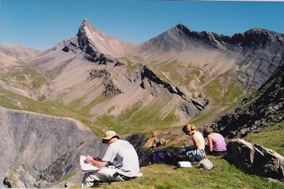
Geoscientist Online 17 July 2007
"Oh this year I'm off to sunny Spain - Y Viva España…"
Thirty years on from Sylvia Vrethammer’s 1974 hit, cheap flights, more attractive marketing and the 2001 foot and mouth crisis mean that British geology students are now more likely than ever to learn their field-craft out of Benidorm rather than Ballachulish.
Now the British Standards Institute has published BS 8848 - “A specification for adventurous activities, expeditions, visits and fieldwork outside the UK”. It sets out the protocols and necessary lexicon for the “operational management, including safety, of all ventures outside the UK”.
The range of activity to which BS 8848 refers is vast – from guided mountaineering expeditions up Himalayan peaks (its very name comes from the metric height of Everest) to, as one wag put it, "taking hoodies on rafting trips". There is some fury among the small adventure travel companies in the UK about the lack of consultation and the perceived implementation costs. Why have a standard that embraces everything from Himalayan mountaineering to a day’s inshore sailing in the Med? Some in the education world are unhappy that “thrill-seeking” adventure holidays are bundled in with teaching and learning activities. Nevertheless BS 8848 claims to be a guide to best practice in fieldwork. BSI recognises that conformance will require “adjustments and reviews of existing codes of practice” even when they are working well. So it is indeed strange that they did not draw more widely to identify existing examples of good practice, particularly in the higher education sector and especially within the Earth sciences. Apart from a curtailed call for input, the BSI relied on the Royal Geographic Society alone to represent fieldwork.
Before we all get hot under the collar – let’s see what BS 8848 is about. Given the vast scope it would have been easy for the Standard to over-reach itself. But it does not attempt to micro-manage risk assessment and response strategies for specific situations. Rather it lays out a coherent process within which a single “venture provider” takes on responsibility for the entire operation, defining an all-encompassing “risk analysis and management system”.
Many adventure holiday companies subcontract activities to specialists – which can blur responsibilities. We do it too – by using accommodation and coach (or vehicle hire) companies to provide logistics. All need to conform to stringent Heath and Safety standards. Of course this is sensible – at present we may take too much of this on trust. But it will make for extra bureaucracy – maintaining the necessary paper trails.
It gets more challenging for independent fieldwork. Students will need to make informed decisions themselves – so training in how to ensure an overseas hostel has appropriate fire or hygiene protocols may be needed. This will also apply to postgraduates – traditionally left to fend for themselves on research fieldwork. BS 8848 doesn’t stop this happening, but it does challenge universities to put appropriate training in place before signing off on fieldwork plans.
When Vrethammer sang “but every dog must have his lucky day, and that is why I’ve learnt the way to shout ‘olé’!” – she may not have been thinking of the litigators. Even if BS 8848 is voluntary, are university lawyers advising their clients to sign up to the Standard? The crucial question is – will it make geological fieldwork any safer?
On the ground, effective hazard and incident management is likely to reflect the competence, expertise, experience and leadership of the immediate staff, coupled with effective student training. A fear remains that the more we rely on written protocols the less on-the-ground common sense is valued. Once we embark on standardisation, an accident to a student from a BS 8848 compliant university may lead to calls for more stringent and restricted processes that further erode the values of individual responsibility and independent discovery that are strengths of geological fieldwork.
Consultation on BS 8848 remains open until 23April 2008. So please send comments to Sarah Horsfield, BSI, 389 Chiswick High Road, London W4 4AL, UK.
[email protected]
Rob Butler teaches at the University of Leeds.